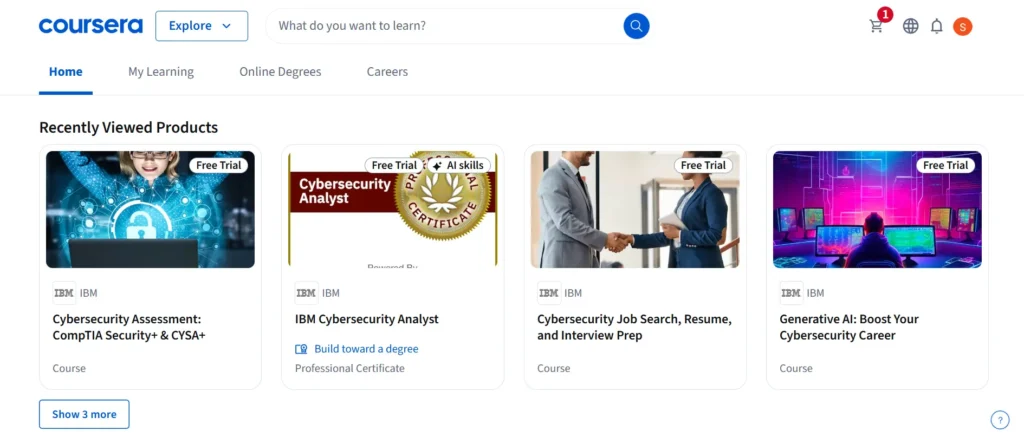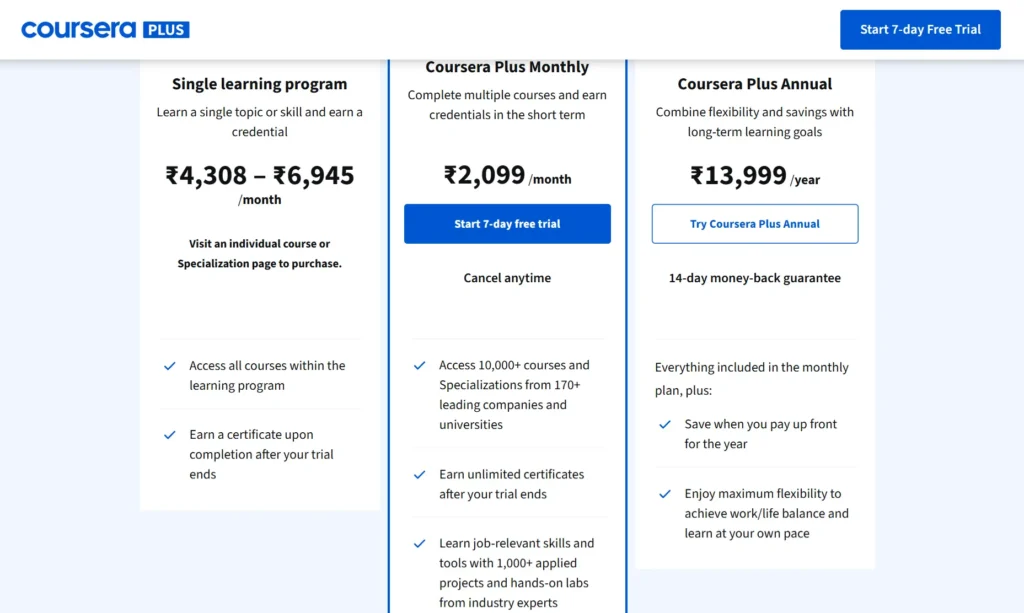(Disclaimer: This post includes our affiliate links. Rest assured, they don’t affect our reviews.)

(Announcement: Hey everyone, before we dive into this article. Here is a great news – With the EOY sale, Coursera Plus is currently available with $200 off (50% discount) – valid globally – until December 29, 2025. And, if you’re from India, it’s only INR 7,499/year. Don’t miss out on this massive sale.)
Coursera vs Coursera Plus – What are the differences and which one should you choose?
I’ve been taking Coursera courses for many years, and based on my personal experience, I’m going to share everything you need to know about Coursera and Coursera Plus.
First, let’s make one thing clear: Coursera Plus is a subscription plan offered by Coursera that gives you access to over 10,000 courses, including most professional certificates and specialization programs available on the platform.
In simple terms, with Coursera Plus, you pay a single fee and unlock access to most programs that you would otherwise need to purchase separately.
In this article, I’ll cover everything—how much Coursera Plus costs, what it includes (and what it doesn’t), who should choose Coursera vs Coursera Plus, and the pros and cons of both, and whether Coursera and Coursera Plus are worth it.
Trust me, after reading this, you won’t need to look for another comparison article. And if you want to skip straight to my recommendation, just scroll down to the Final Thoughts section.
Before we dive in, here’s a quick heads-up: Coursera is currently offering 40% off on the Coursera Plus annual plan worldwide. And if you’re in India, you can grab Coursera Plus for just ₹7,999 (regularly ₹14,000/year). Both offers are valid until December 1st, 2025. To learn more about these discounts—and how they can give your career a real boost—check out the links.
Let’s start with a basic question…
What Are Coursera and Coursera Plus?

Coursera is one of the world’s leading online learning platforms, offering courses across a wide variety of fields from top universities and global tech companies.
From business and cybersecurity to data science, IT, machine learning, AI, computer science, healthcare, personal development, social sciences, arts & humanities, and even language learning—you’ll find thousands of courses taught by world-class universities and industry leaders.
Coursera’s courses are offered in different formats, such as degrees, professional certificates, specialization programs, and guided projects. You can pay for these individually, but Coursera also offers many free courses.
What Is Coursera Plus?
Coursera Plus is a subscription plan designed for learners who want to take multiple courses or certificate programs in a cost-effective way.
With Coursera Plus, you get access to 10,000+ courses, including most professional certificates, specializations, and guided projects. However, degree programs and a few certificates from certain universities are not included (we’ll discuss what’s included and excluded later in this article).
Coursera vs Coursera Plus: Cost Differences
How Much Does Coursera Cost?
Coursera’s pricing can be a bit confusing since it depends on the type of program you choose. Here’s a breakdown:
- Full Degrees: Start at $9,000+
- Specialization Programs: Around $49 per month
- Professional Certificates: Start at $49 per month
- Guided Projects: Start at $9.99
When you pay for one of these, you only get access to that specific program—you can’t switch to another without paying again.
💡 Note: Prices may vary depending on your location. In addition, Coursera also offers thousands of free courses from top universities and tech companies.
How Much Does Coursera Plus Cost?
Coursera Plus costs $59 per month or $399 per year.
With this subscription, you get unlimited access to:
- Most professional certificates and specialization programs from Google, IBM, Meta, Microsoft, and other top universities and companies.
- A wide range of guided projects (normally priced from $9.99 each).
The best part? With Coursera Plus, you can switch between different programs anytime or even enroll in multiple programs at once—without paying separately for each.
Here is another cool thing: Coursera often offers huge discounts on Coursera Plus, which is worth considering. To stay updated with these offers, you can subscribe to my newsletter here.)
When you subscribe to Coursera Plus (monthly or annual), you also get a 7-day free trial which is not available with Coursera individual courses.
Now, let’s take a closer look at the different programs Coursera offers—and what’s included (and excluded) with Coursera Plus.
What Coursera Offers: Different Types of Programs

Coursera gives learners multiple ways to achieve their goals—whether it’s earning a degree, gaining job-ready skills, or simply exploring a new subject. You can choose from free courses all the way up to fully accredited online degree programs from world-class universities. Here’s a breakdown:
1. Online Degree Programs
Coursera partners with top universities and colleges to offer fully online bachelor’s and master’s degrees. These programs let you earn a recognized degree from the comfort of your home.
2. MasterTrack® Certificates
MasterTrack® Certificates are advanced programs that provide in-depth knowledge in a specialized field. Delivered by leading universities, they include graded assignments and assessments.
- Typical duration: 4–7 months
- May require prerequisites such as a bachelor’s degree or specific skills, depending on the subject
3. Specialization Programs
Specializations are a series of related courses that dive deep into a single topic or skill set. They usually include hands-on projects and a capstone assignment.
- Typical duration: 3–6 months
- Completion earns you a certificate
4. Professional Certificates
Professional Certificates are designed to help you develop job-ready skills in high-demand areas such as data science, project management, and digital marketing.
One of the most popular examples is Google Career Certificates, which prepare learners for entry-level jobs in tech—no degree or prior experience required.
5. Guided Projects
Guided Projects are short, project-based courses that teach practical, hands-on skills in just a few hours. They’re perfect for learning a specific tool or technique quickly.
6. Free Courses
Coursera also offers thousands of free courses across a wide range of subjects. You don’t need to add payment details—just sign up and start learning.
- Free courses give access to course content
- If you want a Certificate of Completion, there may be a small fee
What Coursera Plus Offers:
As mentioned earlier, Coursera Plus gives you unlimited access to 10,000+ courses, including:
- Specialization Programs
- Professional Certificates
- Guided Projects
- Free courses (included automatically)
However, Coursera Plus does not cover:
- Online degree programs
- MasterTrack® Certificates
- Certain certificates from specific universities and companies (for example, some DeepLearning programs and certifications are not included).
👉 Coursera has published an updated list of what’s included and excluded, which is worth checking before you subscribe.
What Are the Differences Between Coursera and Coursera Plus?
The main difference lies in how you pay and what you get access to. Let’s take a closer look at all the differences with different aspects.
- Learning Model
- Coursera: Pay per course/program (some free courses also available).
- Coursera Plus: One subscription unlocks access to most courses.
- Programs Included
- Coursera: All programs available (degree programs, MasterTrack Certificates, professional certificates, specializations, guided projects, free courses).
- Coursera Plus: Includes 10,000+ courses, specializations, professional certificates, guided projects, and free courses.
- What’s Excluded
- Coursera: Nothing excluded—you just pay individually for what you want.
- Coursera Plus: Does not include degree programs, MasterTrack Certificates, and some popular certificates (like IBM Professional Certificates).
- Cost
- Coursera: $39–$79 per month for most professional certificates and specializations. Degree programs cost thousands of dollars.
- Coursera Plus: $59/month or $399/year (global). In India, discounted to ₹7,999/year (regular ₹14,000).
- Free Trial
- Coursera: No free trial when you enroll in a paid program.
- Coursera Plus: 7-day free trial also available with subscription.
- Best For
- Coursera: Learners who only want 1 program or need excluded options like degrees/MasterTrack/IBM Certificates.
- Coursera Plus: Learners who want multiple paid programs and cost-effective, unlimited access.
Coursera vs Coursera Plus: Which One Should You Choose?
Who is Coursera Best For?
- If you want to pursue degree programs or MasterTrack® Certificates, there’s no need to get a Coursera Plus subscription—these aren’t included.
- Also, if your goal is just to complete one specific program on a subject, it’s better to purchase it individually (or enroll for free if available). In such cases, Coursera Plus may actually cost you more.
- Since Coursera Plus does not includes some of the best programs from certain universities and companies (like the DeepLearning courses) so, If you plan to enroll in their, you better choose Coursera over Coursera Plus.
Who is Coursera Plus Best For?
- On the other hand, Coursera Plus is perfect for learners who want to explore multiple courses or certificates. If you plan to take several paid programs, Coursera Plus turns out to be a much more cost-effective option.
- It’s also great if you want the flexibility to explore courses from different universities and companies, across various subjects.
- In short, Coursera Plus is ideal for avid online learners who see learning as a lifelong journey. If you enjoy continuous learning and want unlimited access without worrying about paying separately each time, Coursera Plus is the smarter choice.
Coursera vs Coursera Plus – Pros and Cons

Based on my personal experience, here are the pros and cons of Coursera and Coursera Plus. To make it simple:
- The advantages of Coursera Plus are usually the cons of Coursera.
- The advantages of Coursera are often the cons of Coursera Plus.
✅ Advantages of Choosing Coursera Plus (over Coursera)
- Cost-effective for multiple courses – If you plan to learn several skills (personal or professional), Coursera Plus gives you unlimited access without paying separately.
- Flexibility to explore – You can try different topics, switch courses anytime, and explore various fields without worrying about costs.
- Certificates included – You can earn completion certificates for all courses you finish during your subscription, which are great for showcasing skills to employers.
✅ Advantages of Choosing Coursera (over Coursera Plus)
- Cost-effective for single programs – If your goal is to complete just one program, paying for it separately may be cheaper. The faster you finish, the less it costs you.
- Access to excluded programs – Some popular certificates (like certain IBM Professional Certificates) are not included in Coursera Plus. Buying them separately on Coursera is the only option.
- Better course commitment – When you pay for a single course, you’re more likely to stay focused and complete it. With Coursera Plus, the abundance of options can lead to enrolling in many courses but completing none.
Final Thoughts: Coursera vs. Coursera Plus – Which Is Best?
Final Thoughts: Coursera vs Coursera Plus – Which One Should You Choose?
Both Coursera and Coursera Plus are excellent options—it really depends on your goals.
- If you want to pursue a degree, MasterTrack® Certificate, or just one specific course, then enrolling directly through Coursera makes more sense. It’s often cheaper and gives you access to programs not included in Coursera Plus.
- But if you’re someone who wants to learn continuously, explore multiple skills, and switch between programs freely, Coursera Plus is the smarter and more cost-effective choice.
From my own experience, Coursera Plus feels like an “all-you-can-learn” pass—it gives you the freedom to explore without worrying about individual costs. On the other hand, Coursera itself is perfect for learners with a specific program or credential in mind.
No matter which option you choose, you’re learning from world-class universities, leading tech companies, and renowned experts, which makes both Coursera and Coursera Plus valuable investments in your personal and professional growth.
Now It’s Your Turn:
I hope this comparison of Coursera vs Coursera Plus helped you understand the key differences and decide which option suits your learning goals best.
Now, I’d love to hear from you:
👉 Will you go for Coursera (individual programs) or Coursera Plus (the subscription plan)?
If you have any questions or thoughts about Coursera, feel free to drop them in the comments—I’d be happy to help!
Coursera vs. Coursera Plus: FAQs
Is Coursera Plus Necessary?
Not really. Coursera Plus isn’t necessary for everyone. While it does offer great perks—like unlimited access to thousands of courses, specializations, and professional certificates—it may not be cost-effective if you only plan to take one or two courses.
It’s better to first consider your learning goals, budget, and the number of courses you plan to complete. Many learners get plenty of value from Coursera’s free courses or by paying individually for a specific program. So, whether Coursera Plus is “necessary” really depends on how much you plan to use it.
Is Coursera Plus Worth It?
In my opinion, yes—Coursera Plus is worth it, especially if you want to take multiple courses.
Here’s why:
➡️ Access to 90% of Coursera’s content (10,000+ courses)
➡️ Includes professional certificates & specializations
➡️ Individual certificates cost $39–$49/month, while Plus is $59/month
➡️ Offers strong value compared to platforms like Udacity
➡️ Best for learners who want long-term or career-focused learning
That said, the real worth depends on your budget, the number of courses you plan to take, and how long you’ll be learning. If you’re committed to lifelong or career-focused learning, Coursera Plus can save you a lot in the long run.
Does Coursera Plus Include Certificates?
Yes, Coursera Plus includes certificates for all the courses, specializations, and professional certificates covered under the subscription. This means:
You’ll earn a verified certificate after completing any included program.
Certificates can be added to your LinkedIn profile or resume to showcase your skills.
You don’t need to pay extra for certificates—they’re already part of the Coursera Plus plan.
⚠️ Note: Certificates for programs not included in Coursera Plus (such as degree programs, MasterTrack® Certificates, or some excluded university certificates) are not covered. You’d need to purchase those separately.
How to Save on Coursera and Coursera Plus?
➡️ Free Courses – Coursera offers thousands of free courses from top universities and companies. You only pay if you want a certificate.
➡️ 7-Day Free Trial – Whether you buy Coursera Plus, you get a 7-day free trial to explore before paying.
➡️ Discounts on Coursera Plus – Coursera frequently runs promotions (like 30% off globally). If you’re in India, you can often grab the Coursera Plus annual plan at just INR 7,999 (regular price ~14k).
➡️ Cost-Effective Choice – If you only want one program, buying it individually may save money. If you plan to take multiple programs, Coursera Plus is far more affordable.
Happy learning 🙂

